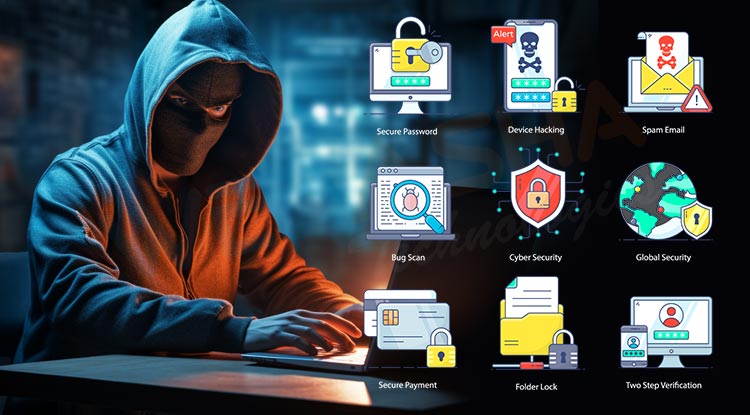The field of cybersecurity is experiencing unprecedented growth, driven by increasing digital adoption, rising cyber threats, and the government’s push for digital transformation. This demand has created a significant need for skilled cybersecurity professionals, leading to a proliferation of courses and certifications designed to equip individuals with the necessary knowledge and practical skills.
Cybersecurity courses cater to a wide range of learners, from complete beginners looking to enter the field to experienced IT professionals aiming to specialize or advance their careers. These courses vary in duration, depth, format, and the specific domains of cybersecurity they cover.
Types of Cybersecurity Courses Available:
1. Degree Programs (UG & PG): For those seeking a comprehensive academic foundation, many universities and colleges offer full-fledged degree programs:
- B.Tech/B.Sc. in Computer Science with a specialization in Cybersecurity: These are undergraduate programs, typically lasting 3-4 years, providing a broad understanding of computer science principles alongside specialized cybersecurity topics.
- M.Tech/M.Sc. in Cybersecurity or Information Security: Postgraduate programs (2 years) delve deeper into advanced cybersecurity concepts, research methodologies, and often include practical projects.
- PG Diplomas: Shorter than a Master’s degree, these diplomas (usually 1 year) offer specialized training in areas like Cyber Security & Forensics, or IT Infrastructure, Systems, and Security.
2. Professional Certifications: These certifications are highly valued in the industry and often focus on specific cybersecurity domains or vendor technologies. They are ideal for both beginners and experienced professionals looking to validate their skills.
- Vendor-Neutral Certifications:
- CompTIA (Computing Technology Industry Association):
- CompTIA Security+: A foundational certification covering core security concepts, widely recognized as an entry-level benchmark.
- CompTIA CySA+ (Cybersecurity Analyst): Focuses on security analytics, threat detection, and response.
- CompTIA PenTest+: For penetration testing and vulnerability assessment.
- CompTIA CASP+ (Advanced Security Practitioner): For advanced security engineering and architecture.
- (ISC)²:
- CISSP (Certified Information Systems Security Professional): A globally recognized advanced certification for experienced security professionals.
- SSCP (Systems Security Certified Practitioner): For hands-on security professionals.
- ISACA:
- CISA (Certified Information Systems Auditor): For IT audit and control professionals.
- CISM (Certified Information Security Manager): For those managing, designing, and overseeing enterprise information security programs.
- CompTIA (Computing Technology Industry Association):
- Vendor-Specific Certifications:
- EC-Council:
- CEH (Certified Ethical Hacker): One of the most popular certifications for ethical hacking and penetration testing.
- CPENT (Certified Penetration Testing Professional): Advanced penetration testing.
- CCT (Certified Cybersecurity Technician): Entry-level cybersecurity skills.
- CHFI (Computer Hacking Forensic Investigator): Digital forensics and incident response.
- CCSE (Certified Cloud Security Engineer): Focuses on cloud security.
- Cisco: Cisco offers various security certifications, including Cisco Certified Support Technician (CCST) Cybersecurity, CCNP Security, and CCIE Security.
- EC-Council:
3. Short-Term Courses and Bootcamps: These are intensive, practical programs designed to get individuals job-ready quickly. They often include hands-on labs, real-world projects, and sometimes placement assistance.
- Ethical Hacking: Courses specifically focused on penetration testing, vulnerability assessment, and ethical hacking tools like Kali Linux.
- Digital Forensics: Training in investigating cybercrimes, data recovery, and evidence analysis.
- SOC Analyst (Security Operations Center Analyst): Focuses on monitoring, detecting, and responding to security incidents.
- Cloud Security: Covers securing cloud environments and platforms (AWS, Azure, GCP).
- Web Application Security: Deals with identifying and mitigating vulnerabilities in web applications.
- Bootcamps: Many private institutes and online platforms offer bootcamps ranging from a few weeks to several months, providing immersive training.
Choosing the Right Course:
When selecting a cybersecurity course, consider the following:
- Your Current Background: Are you a beginner, or do you have an IT background?
- Career Goals: What specific role do you aspire to (e.g., ethical hacker, security analyst, auditor)?
- Course Content: Does the syllabus align with your interests and career path?
- Practical Component: Does the course offer hands-on labs, real-world projects, and simulations?
- Certification/Accreditation: Is the certification widely recognized and respected in the industry?
- Faculty Expertise: Are the instructors industry professionals with practical experience?
- Placement Assistance: If you’re new to the field, does the institute offer job placement support?
- Cost and Duration: Fit the course within your budget and time availability.
The cybersecurity landscape is dynamic, and continuous learning is essential. Many professionals combine formal education with industry certifications and self-study to stay abreast of emerging threats and technologies.





